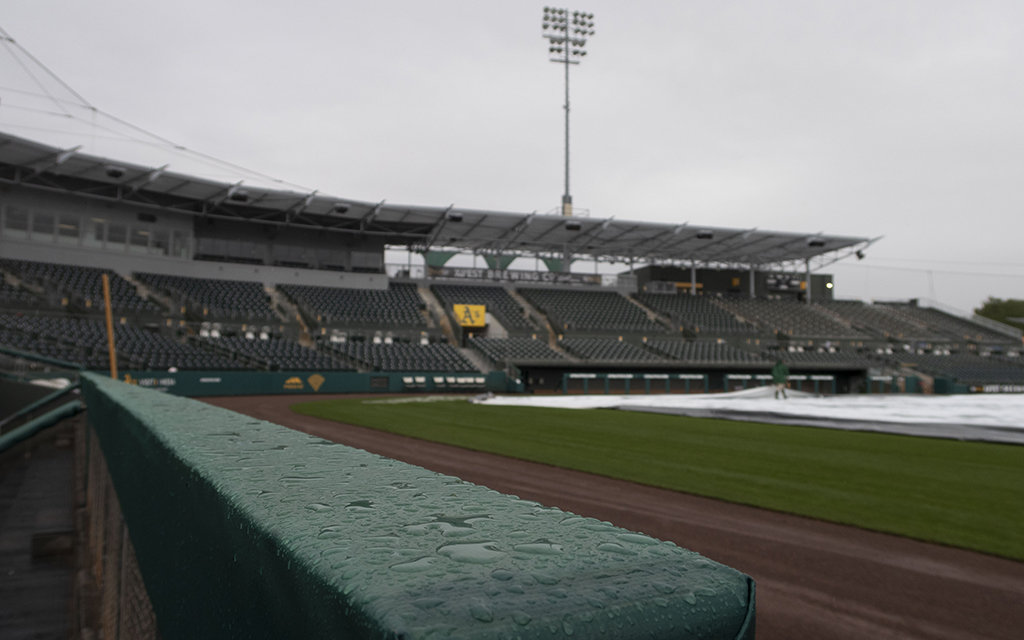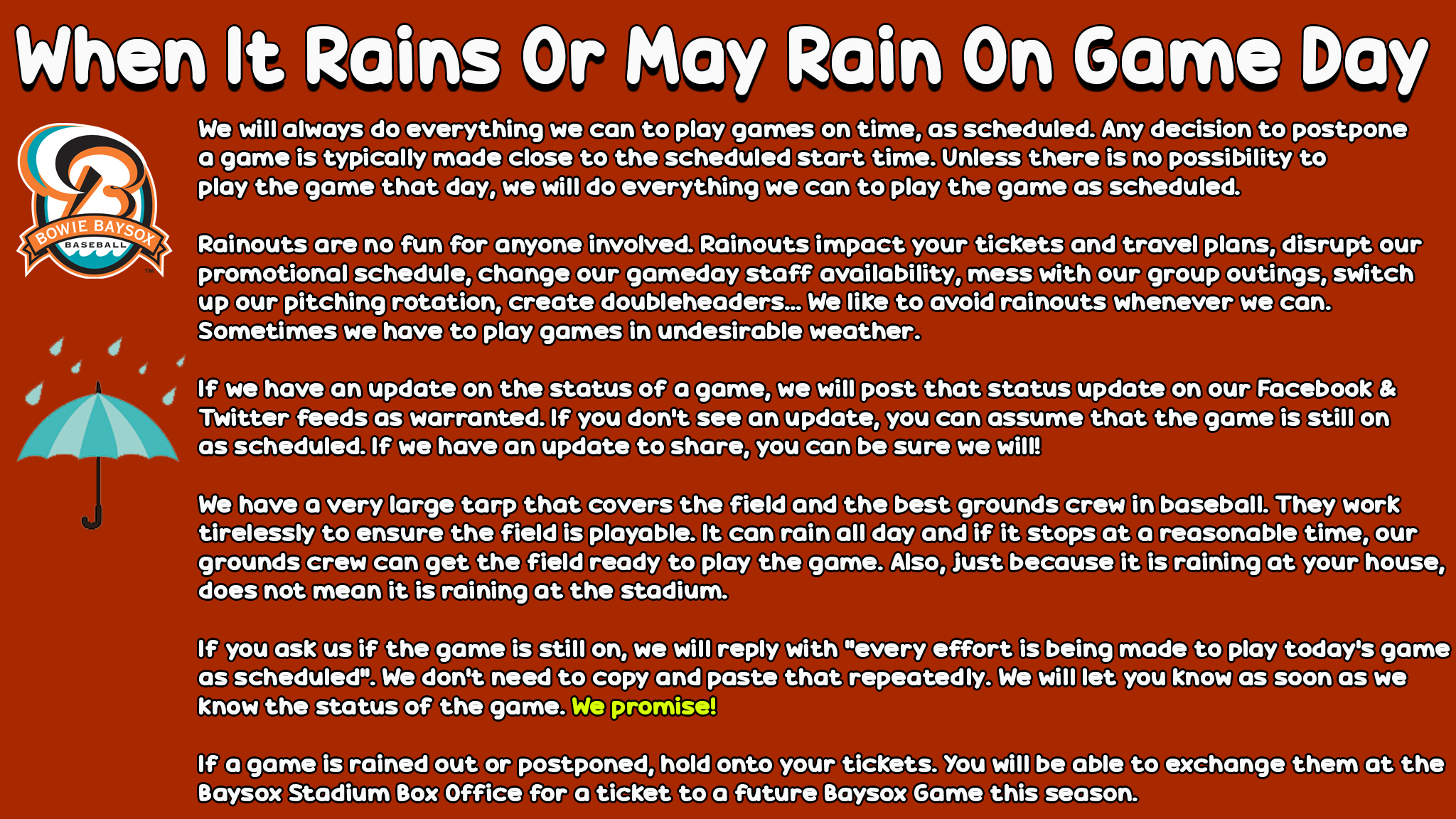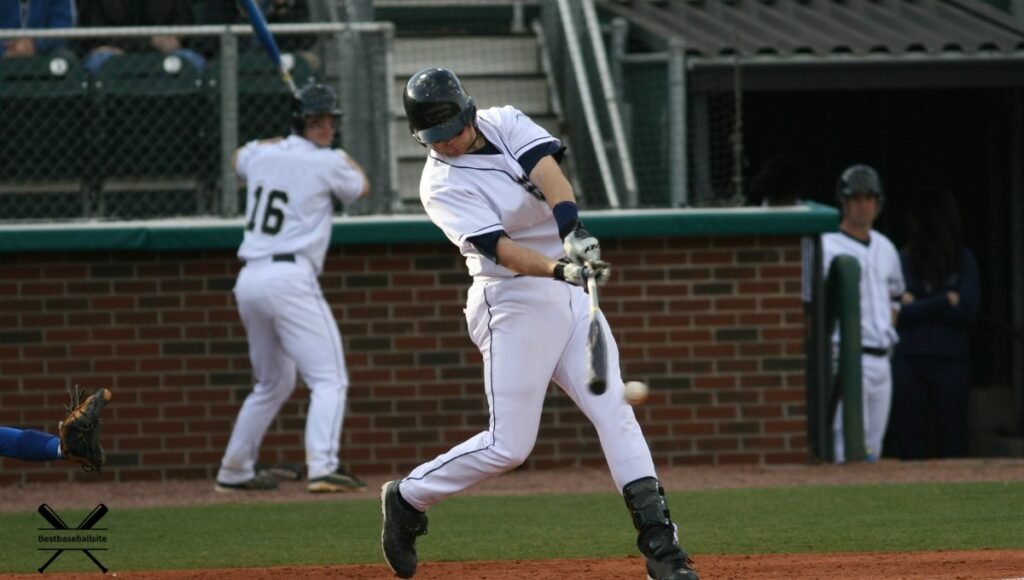Baseball games can proceed in light rain, although heavier rain could result in a delay or cancellation. Player safety and field conditions typically determine whether the game will continue.
Baseball, America’s pastime, often pushes through mild weather disturbances. Light rain poses minimal challenges, allowing the players to stay on the diamond and fans to enjoy the spectacle beneath their umbrellas. Stadiums are equipped to handle these wet conditions, with grounds crews ready to maintain the playing surface’s integrity.
Moreover, professional baseball leagues have clear guidelines on when to pause or abandon play due to inclement weather. The decision hinges on ensuring the athletes’ safety and preserving the game’s competitive balance. Umpires and officials keep a watchful eye on the skies, ready to make the call if the rain intensifies. Fans eagerly check forecasts and game updates, knowing that a sudden downpour might alter the course of the day’s entertainment.
Rain And Baseball Rules
Clouds gather and raindrops start to fall. But what happens next in a baseball game? Let’s dive into the rules that major league baseball follows when rain starts to pour.
Game Postponements
Not every rainy day means a canceled game. Baseball can handle light rain. But if the rain is heavy, it can stop play. Here are some key points:
- Players’ safety comes first – Slippery conditions are risky.
- The field must be playable – (Puddles are not a good sign!) Mud and water can ruin the field.
- Visibility matters – Players and umpires need to see the ball.
When these conditions aren’t met, officials may pause or postpone the game. Teams and fans must wait for a better day.
Umpire’s Discretion
The umpire keeps a close eye on the situation. It is this person’s tough job to decide:
- When to halt the game – In bad weather, the umpire makes the call.
- Play resumption – The umpire decides if and when the game will continue.
- Game result decisions – In some cases, the umpire can call a game final even if it’s not complete.
These decisions come from years of experience and a deep understanding of baseball rules.

Credit: cronkitenews.azpbs.org
Playing Conditions
Baseball is a game played outdoors and ‘Playing Conditions’ can greatly impact the game. Rain is a common element that can change how the game is played. Let’s explore the main concerns when rain enters the equation.
Field Safety Concerns
Rain makes the baseball field slippery. Players can easily get hurt. Wet grounds are a risk for everyone. Here are key safety concerns:
- Muddy infields increase the chance of slips.
- Standing water can cause players to lose balance.
- Wet balls are harder to grip, leading to erratic throws.
Effect On Players’ Performance
Rain affects how players perform. Pitchers struggle to control the ball. Batters have difficulty hitting wet balls. Here’s how performance gets impacted:
| Player | Impact |
|---|---|
| Pitchers | Less grip, decreased accuracy |
| Batters | Wet bats, harder to swing with precision |
| Fielders | Slippery gloves, tough catches |
Advantage Or Obstacle?
Advantage or Obstacle?
Playing baseball in the rain can really mix up the game. Rain can either help players or make it hard to play. Is it good for the pitcher or the batter? Let’s find out!
Pitchers Vs. Batters In Wet Conditions
Pitching in the rain can be a double-edged sword. Wet weather may allow pitchers to throw sneakier pitches. However, it can also lead to a slippery grip and more walks. Batters face their own set of problems. A wet bat and poor visibility can lead to less power and more strikes. In tables below, you can see the effects on both pitchers and batters:
| Pitchers | Batters |
|---|---|
| Trickier Ball Movement | Dampened Bat Grip |
| Slippery Grip | Reduced Visibility |
| Possible Injuries | Lowered Hitting Power |
Fielders’ Challenges
- Slippery Field: Easy to fall and miss the ball.
- Wet Ball: Hard to throw accurately.
- Visibility: Rain makes it tough to see fly balls.
Fielders face serious tests when rain comes down. They have to deal with a slippery field and wet ball, which can affect their play. They also need to keep their focus under the raindrops and still catch balls flying their way. The list above shows just what they’re up against.
Preparation For Rainy Games
When the skies cloud over and the pitter-patter of rain begins, baseball players must prep for slippery conditions. Damp weather doesn’t have to mean game over. With the right strategies, you can still hit the field and play ball, even when the rain comes down.
Adaptive Gear
Choosing the right gear is vital for rainy baseball games. Players should consider waterproof clothing to stay dry. Non-slip gloves are essential for maintaining a firm grip on the bat and ball.
- Water-resistant jackets keep players warm and dry.
- Cleats with deeper treads provide better traction on wet ground.
- Moisture-wicking undergarments work to keep skin dry.
Equip extras like towels and dry balls to ensure a smooth game flow.
Warm-up Adjustments
Warm-ups need tweaks to prevent injuries in wet conditions. Focus on exercises that raise body temperature and enhance flexibility.
| Exercise | Duration | Benefit |
|---|---|---|
| Dynamic Stretching | 10 mins | Boosts flexibility |
| Jogging | 5 mins | Increases heart rate |
| Throwing Drills | 10 mins | Warms up the arm |
Spend more time on mobility drills to ensure your muscles are ready. Always end with a dynamic stretch to maximize movement.
Historic Rainy Matches
Rain often sends players and fans running for cover. But sometimes, baseball defies the elements, creating epic moments etched in sports history. Some games become legendary not just for their plays, but for their battles against the weather. Now, delve into the unforgettable rain-soaked games that left an indelible mark on baseball’s rich tapestry.
Memorable Games In The Rain
- World Series Deluge: The 2011 World Series saw the Texas Rangers and St. Louis Cardinals clash in a rain-interrupted game six that featured heroic comebacks and unforgettable drama.
- April Showers Bring May Powers: An early-season showdown in 1997 between the Orioles and Mariners became a soggy slugfest, showcasing the players’ tenacity in the pouring rain.
- Soaked Subway Series: Cross-town rivals, the Yankees and Mets, faced off in a 2000 matchup as the heavens opened, making every pitch and swing a slippery challenge.
Historic Decisions Affected By Weather
Rain check policies in the early 1900s didn’t exist like today, changing the course of baseball history.
- In 1916, a downpour couldn’t stop Babe Ruth from pitching a complete game, forever altering his career trajectory and contributing to his legend.
- The 1989 World Series between the Athletics and Giants faced a significant delay due to the Loma Prieta earthquake, profoundly impacting the players and outcome.
| Date | Teams | Outcome |
|---|---|---|
| October 27, 2011 | Rangers vs Cardinals | Cardinals win in nail-biter |
| April 20, 1997 | Orioles vs Mariners | Mariners power through |
| June 11, 2000 | Yankees vs Mets | A game to remember |
Stadium Design And Drainage
Baseball matches sometimes face a wet obstacle: rain. The design of a baseball stadium plays a crucial role in whether the game can go on. Good design includes efficient drainage systems that clear water fast. This keeps the field dry and safe for play.
Innovations In Stadium Technology
Modern stadiums use cutting-edge technology to battle rain delays. These advancements include smart drainage solutions that are hidden beneath the field. They quickly move water away from the surface.
- Automated moisture control systems detect and react to rain.
- Sub-air systems pull water through the turf, speeding up drying.
- Materials like sand and peat moss aid in quick drainage.
Maintaining Playable Surfaces
It’s not just about removing water. It’s also about keeping the field play-ready.
| Action | Purpose |
|---|---|
| Tarp coverage | Protects infield from water |
| Turf management | Prevents grass damage |
| Regular aeration | Improves field drainage |
Ground crews work tirelessly to prepare and repair fields. They ensure a quick return to action after the rain stops.
Fan Experience In Inclement Weather
The thrill of a baseball game doesn’t have to diminish when rain starts to pour. Stadiums have adapted to ensure that fans still enjoy the game, even when the weather doesn’t play along. Below, we explore how rain impacts the fan experience and what amenities are in place to keep you comfortable and entertained.
Stadium Amenities For Comfort
Baseball stadiums are well-equipped to handle inclement weather. Here are some amenities that enhance the fan experience during a rainy game day:
- Covered seating areas to keep you dry.
- Heated concourses where you can warm up.
- Plenty of food and beverage stands under shelter.
- Team stores to shop for gear while staying dry.
- Interactive exhibits and games for fans of all ages.
Broadcast Adjustments For Rain Delays
When rain leads to game delays, broadcasters work hard to keep the audience engaged. They implement unique strategies for a delightful viewing experience:
- Live interviews with players, coaches, and experts.
- Replays of memorable game moments and highlights.
- Interactive segments with viewer participation.
- Trivia and live polls for at-home fan engagement.
Mastering The Wet Field
Mastering the Wet Field poses unique challenges for baseball players. Rain transforms the game, making typical strategies and movements more complex. From the grip on the bat to the way a ball skids across the field, every element changes. Understanding how professionals handle these conditions can turn a rained-out look like an opportunity for victory.
Strategies Used By Professionals
- Choose appropriate footwear with extra traction for stability.
- Spike patterns on cleats may change to accommodate slick surfaces.
- Wear gloves designed for wet weather to maintain grip.
- Shorten swings and adjust stances for better bat control.
- Focus on keeping the ball on the ground to prevent losing sight of it.
Adapting To Slipping And Sliding
Preventing slips and falls is crucial under wet conditions. Players adjust their techniques to maintain balance and precision on the field. Rapid directional changes become riskier, urging them to move with cautious agility.
| Action | Adaptation |
|---|---|
| Fielding | Use two hands for secure catches. |
| Throwing | Dry the ball with jersey before the throw. |
| Base Running | Take wider turns to prevent skidding. |
| Batting | Limit follow-through to avoid slipping. |
The secret to successful play in the rain is to embrace the conditions. By leveraging professional techniques and adapting movements to suit the slippery terrain, players can maintain high performance even amidst challenging weather.
Baseball Leagues’ Rain Policies
Ever wondered what happens to baseball games when the rain pours? Each baseball league has specific rules in place. Let’s explore how rain affects game day for different leagues. Understanding these policies helps fans know what to expect when the clouds roll in.
Major League Baseball (mlb)
The MLB takes a cautious approach to rain. Games may proceed if the rain is light. But heavy rain can cause a delay or even a postponement. Umpires and team managers decide on rain delays. Safety for players and fans always comes first.
- Game Start Delays: If rain begins before the game, officials may delay the start.
- In-Game Delays: If a game is underway, it may be paused temporarily.
- Suspensions & Cancellations: A game that can’t continue on the same day might resume at a later date or be cancelled if conditions don’t improve.
Make-up games can be scheduled in case of cancellations.
Minor And Collegiate Leagues
Rain policies in Minor and Collegiate Leagues are similar to the MLB but with more variations. Local rules and stadium facilities can influence decisions.
| League Level | Delay Policy | Postponement |
|---|---|---|
| Minor Leagues | Umpire’s discretion; often similar to MLB | Rescheduled games or double-headers |
| Collegiate | Depends on conference rules | Possible next-day continuations |
Player safety and game integrity stay at the core of rain decisions in these leagues.

Credit: twitter.com
When The Game Must Go On
Sometimes, baseball defies the elements. Rain or shine, the game must happen. This is especially true during important moments in the season. Teams and fans alike brace for bouts of rain. They all hope that the beloved crack of the bat won’t be silenced by the weather.
Playoffs And Critical Games
High stakes often mean playing through the drizzle. In the playoffs, every game is crucial. A rainout could disrupt a team’s momentum or pitching strategy. That’s why officials often push through light rain.
- Delays are minimized to maintain the schedule.
- Ground crews work tirelessly to keep the field playable.
- Tarp covers can quickly roll out at the first sign of rain.
Instances When Rain Can’t Stop Play
While heavy downpours will call off a match, many instances exist where rain cannot stop the play. Dedicated to keeping the action going, players and personnel adapt to weather challenges through:
- Dedicated sump pumps to remove standing water.
- Enhanced drainage systems embedded in the field design.
- High-absorbency drying materials that groundskeepers spread across the infield.
In youth leagues or casual games, the call to play or not rests with coaches and organizers. Safety and fun stay at the forefront.

Credit: www.facebook.com
Frequently Asked Questions For Can You Play Baseball In The Rain
Can You Still Play Baseball In The Rain?
Yes, you can play baseball in light rain, but heavy rain or lightning can cause a game to be postponed for safety reasons. Umpires or officials will decide if conditions are safe for play to continue.
How Much Rain Will Cancel A Baseball Game?
There is no set amount of rain that automatically cancels a baseball game. The decision to cancel depends on factors such as rainfall intensity, field conditions, and forecasted weather.
How Does Rain Affect A Baseball?
Rain can cause baseballs to become slippery and heavier, affecting pitch control and flight distance. Wet conditions may also slow down fielders and disrupt gameplay, leading to possible delays or cancellations.
Conclusion
Wrapping up our discussion, rain doesn’t have to stop your baseball game. It’s clear that with proper safety measures, you can still enjoy the sport amidst drizzles. Remember to prioritize player safety and consult field conditions. So, grab your gear, keep an eye on the weather, and swing into action, even when the sky turns grey.


